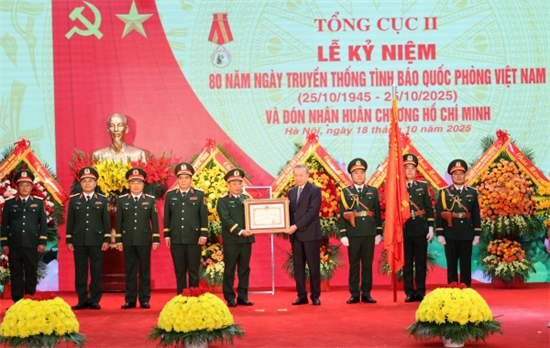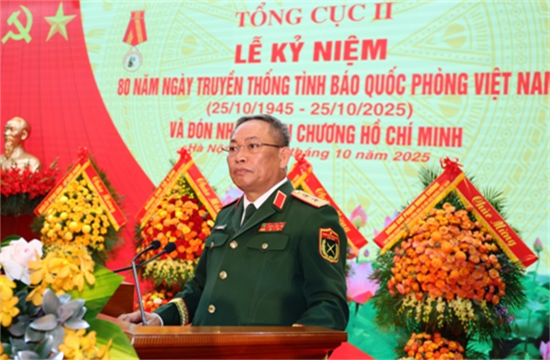Upholding the heroic tradition and building the Defence Intelligence commensurate with tasks
Defence Intelligence is the “eyes and ears” of the nation - a politically steadfast and absolutely loyal force of the Party, the State, the Army, and the People. Fully aware of that immense honour and responsibility, the Defence Intelligence has been implementing comprehensive measures to successfully accomplish its assigned political tasks, contributing to the firm construction and defence of the Socialist Republic of Vietnam and laying the foundation for the country to advance confidently into the new era.
After the triumph of the August Revolution in 1945, the nascent revolutionary government faced both internal and external enemies in a tight corner. In response, the Party Central Committee and President Ho Chi Minh directed the General Military Commission to establish a specialised force responsible for gathering, assessing, and accurately forecasting the situation regarding both friend and foe, as well as the schemes and activities of reactionary elements - thereby providing the basis for the formulation and implementation of strategic and operational directives. Accordingly, on 25 October 1945, the Intelligence Department under the General Staff was founded, followed shortly thereafter by intelligence sections and branches across the military zones and regions, thereby forming an organised intelligence branch throughout the army.
Over eight decades of building, fighting, and development, successive generations of cadres and soldiers of the Defence Intelligence have consistently demonstrated extraordinary courage, intellect, and mastery of the art of intelligence. They have inherited the wisdom of their forebears, absorbed the finest achievements of global intelligence practice, and upheld the noble nature and glorious traditions of the Vietnam People’s Army. Through ingenuity, bravery, unity, and creativity, they have overcome every hardship and challenge, achieving numerous outstanding feats and making immense contributions to the cause of national liberation, nation-building, and the defence of the Fatherland. For these silent yet brilliant achievements and exceptional service, the Defence Intelligence has been duly recognised and honoured by the Party, the State, and the Army with many prestigious awards and distinctions.
 |
| Party General Secretary To Lam presents the Ho Chi Minh Order to the General Department II |
In the coming years, peace, cooperation, and development are forecast to remain the dominant global trend; however, numerous difficulties and challenges will persist. Strategic competition among major powers, armed conflicts, local wars, high-tech and cyber warfare, and various non-traditional security challenges are expected to grow increasingly complex and unpredictable. The East Sea will continue to harbour latent risks of instability. Domestically, hostile forces are intensifying the strategy of “peaceful evolution,” fostering “self-evolution” and “self-transformation” from within, and aggressively seeking to undermine the Party, the State, and the Army through ever more insidious, sophisticated, and overt methods. This situation places upon the Defence Intelligence exceptionally high and demanding requirements. As a core and particularly trusted force of the Party, the State, the Army, and the People, the Defence Intelligence must continue to demonstrate firm political will, sharp intellect, and strategic acumen - seizing opportunities, overcoming challenges, and implementing comprehensive, effective solutions to accomplish all assigned political missions. In this regard, several key directions must be emphasised as follows:
Firstly, to continue upholding and strengthening the Party’s absolute, direct, and comprehensive leadership in all aspects. The 80-year history of the Defence Intelligence’s establishment, combat, and development has demonstrated that reinforcing the Party’s leadership over intelligence work is both a guiding principle and a vital lesson - as well as an urgent requirement in the present context. Consequently, the Defence Intelligence must consistently place its orientation, development, and all activities under the absolute, direct, and comprehensive leadership of the Party - specifically, under the regular and direct direction of the Politburo, the Central Military Commission Standing Committee, and the Minister of National Defence. It is essential to thoroughly grasp and effectively implement Politburo Resolution No. 48-NQ/TW, dated 25 March 2019, on strengthening the Party’s leadership over intelligence work in the new situation, and Resolution No. 160-NQ/QUTW, dated 13 December 2021, of the Central Military Commission Standing Committee on leading defence intelligence work to meet current and future mission requirements. The focus must be on enhancing the leadership capacity and combat strength of Party organisations, particularly their ability to internalise, concretise, and effectively realise superiors’ resolutions, directives, regulations, and guidelines on Party building - thereby achieving high unity in the Party’s ideology, guidelines, and the missions of both the Army in general and the Defence Intelligence in particular. Agencies and units within the General Department of Intelligence, as well as the broader system of military intelligence and reconnaissance forces, must continue to synchronously and effectively implement the 13th-tenure Central Party Committee’s Conclusion No.21-KL/TW, dated 25 October 2021, on promoting Party and political system building and rectification; resolutely preventing, repelling, and strictly handling cadres and Party members showing ideological, moral, or lifestyle degradation, or signs of “self-evolution” and “self-transformation.” The movement for Determined-to-Win Emulation and high-intensity and breakthrough emulation campaigns should be intensified, closely linked with the campaign Promoting tradition, dedicating talent, and being worthy of the title “Uncle Ho’s Soldiers” in the new era. On that foundation, greater efforts must be devoted to educating, managing, and training cadres, Party members, staff, and soldiers to strengthen their political steadfastness and vigilance against all hostile plots and subversive tactics - thereby firmly safeguarding the ideological bastion of the Party within the Defence Intelligence.
Secondly, to enhance the quality and effectiveness of intelligence collection, assessment, forecasting, and strategic advisory work. As a strategic intelligence organ under the direct leadership of the Party and the State, and simultaneously the specialised military intelligence force of the Central Military Commission and the Ministry of National Defence, the Defence Intelligence must remain firmly aligned with its functions and tasks. It should actively innovate and continuously improve the quality and effectiveness of information collection and situational awareness - covering all domains, regions, subjects, partners, flashpoints, and both international and domestic events - ensuring timeliness and precision. At the same time, it is essential to perfect a scientifically rigorous and tightly structured system for information research and processing, capable of producing accurate assessments, proposals, and recommendations that identify emerging dynamics and strategic issues. Information must reach the leadership of the Party and the State at the earliest possible time - promptly, comprehensively, and with the highest degree of analytical and predictive value - ensuring that no strategic passivity or surprise ever occurs. The development of a solid, flexible, and sophisticated defence intelligence posture must be prioritised, maximising the overall synergy of forces and methods through the close integration of traditional and modern approaches, and the coordination of strategic, operational, and tactical levels. Proactive measures should be taken to design and implement operational plans and strategic intelligence activities that enhance relationships and build strategic trust with key partners, thereby contributing to raising the nation’s international standing and prestige, while preventing and neutralising both traditional and non-traditional security threats. Efforts must be concentrated on closely monitoring and anticipating the intentions, schemes, and tactics of hostile forces, reactionary exiles, opportunist elements, and political dissidents seeking to advance strategies of “peaceful evolution,” foment riots and subversion, and instigate “self-evolution” and “self-transformation” from within. Concurrently, it is necessary to intensify the summarisation and development of intelligence art; to invest in the modernisation of equipment and technical means; and to accelerate the application of science and technology - particularly digital technologies, artificial intelligence, big data analytics, and advanced tradecraft. These breakthroughs will significantly enhance the quality of intelligence research, collection, processing, and analysis, ensuring that defence intelligence fully meets the demands of national construction and defence in the new era.
 |
| Lt. Gen. Tran Cong Chinh delivers a speech at the ceremony to celebrate the 80th anniversary of foudation of the General Department II |
Thirdly, to accelerate the consolidation and development of the organisational apparatus and force structure towards professionalism, compactness, efficiency, and functional alignment. Accordingly, the Defence Intelligence must focus on building an organisational structure that ensures a rational balance between functions, tasks, scale, and quality of organisation, with a firmly established and enduring succession of capable personnel. In the implementation process, emphasis must be placed on developing a synchronised force posture, ensuring balanced deployment across regions - particularly in strategic and key areas. The Strategic Intelligence Force must be built to be politically steadfast, compact in organisation, strong in capability, and highly professional and specialised. The organisational structure and personnel composition must continue to be streamlined and refined. The Cyber Intelligence Force must be further developed under the principle of “leapfrogging and anticipating” technological advancement, while the Strategic Technical Reconnaissance Force should advance directly towards modernisation. Close coordination should be maintained with advisory, command, and training bodies to ensure unified direction, instruction, and supervision in training, combat readiness, and resource allocation. Particular attention must be given to providing adequate funding, equipment, and military-specific policy support to strengthen the capacity of the Military Intelligence and Reconnaissance Force - enabling it to grasp, assess, and report enemy and terrain situations with precision, and to respond swiftly and effectively to any contingency, ensuring strategic initiative and preventing surprise. Efforts must be concentrated on building the Special Reconnaissance Brigades in the direction of regularity, elite performance, and combat proficiency - with compact, mobile organisational structures capable of maintaining high readiness and achieving victory in all operational scenarios.
Finally, to build a contingent of Defence Intelligence cadres capable of meeting the demands of their mission in the new situation. “Intelligence is a science. Those engaged in intelligence must possess four virtues: secrecy, caution, subtlety, and patience.” Intelligence cadres operate covertly across diverse domains, often facing immense challenges, pressures, and occupational risks, and must always be ready to sacrifice for the cause of building and defending the Fatherland, safeguarding the Party, and protecting the socialist regime. Therefore, in order to fulfil its mission with excellence, the Defence Intelligence must focus on developing a contingent of cadres with firm political steadfastness, absolute loyalty, and an unwavering commitment to placing national interests above all else. They must possess sharp professional insight and analytical thinking, professional competence commensurate with their responsibilities, and above all, initiative, alertness, professionalism, creativity, and mastery of foreign languages, technical and tactical skills, knowledge of areas of operation, targets, and intelligence objectives.
This process of cadre development must be carried out rigorously and prudently, adhering strictly to principles and procedures across all stages - from recruitment, training, and professional development to deployment and rotation - ensuring reasonable quantity, continuously improving quality, appropriate structure, and solid continuity to meet both immediate and long-term mission requirements. To provide a high-quality human resource base with professional competence and firm political conviction, the Defence Intelligence will continue to innovate the content, curricula, and methods of education and training, while investing in and upgrading teaching facilities and equipment. Gradually, its academies and schools will be developed in the direction of standardisation, regularity, and modernisation. At the same time, continued research, consultation, and recommendations must be made for establishing special preferential mechanisms and policies to attract high-quality human resources. Proper attention must also be given to implementing welfare and policy regimes for cadres and their families, particularly those serving on the front lines and directly operating in complex and high-risk intelligence environments.
Upholding the noble tradition of being “Loyal, brave, independent, creative, secretive, and subtle - united in determined victory,” the Defence Intelligence will continue to consolidate its political and ideological strength; refine its professional expertise; maintain strict adherence to principles; ensure organisational compactness, integrity, and resilience; and enhance its overall potential and effectiveness. In doing so, it will accomplish all assigned missions with excellence and make worthy contributions to the cause of building and firmly defending the Socialist Republic of Viet Nam in the new era.
Lieutenant General, Dr TRAN CONG CHINH, Director General, General Department II